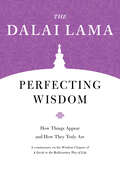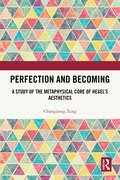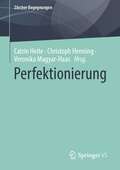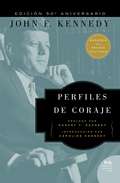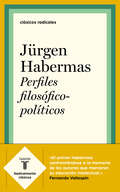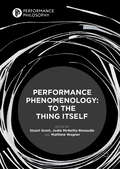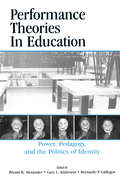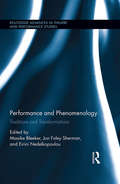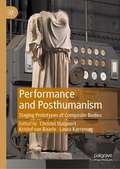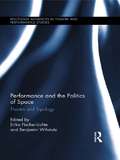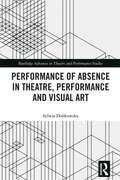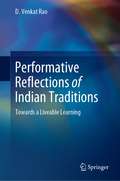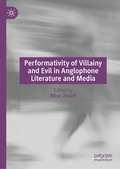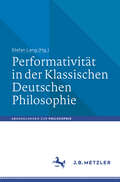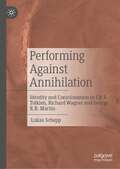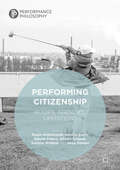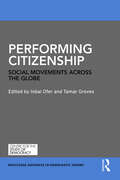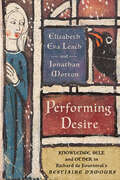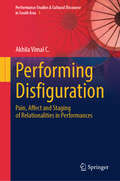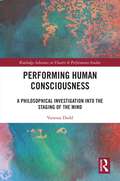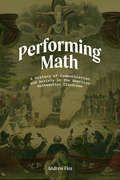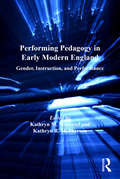- Table View
- List View
Perfecting Wisdom: How Things Appear and How They Truly Are (Core Teachings of Dalai Lama)
by The Dalai LamaBased on a lecture given by the Dalai Lama on the wisdom chapter of A Guide to the Bodhisattva Way of Life, this book comments on Tibetan Buddhist philosophy in a clear and direct way.Shantideva’s A Guide to the Bodhisattva Way of Life is one of the most important texts in the Mahayana tradition of Buddhist practice. Its ninth chapter, the section on transcendent wisdom, is known among Buddhist scholars as a challenging exposition of Madhyamika philosophy and difficult to understand without a commentary. This extraordinarily clear discussion of the wisdom chapter is based on an oral teaching given by His Holiness the Dalai Lama before an audience of thousands of Tibetans and Westerners. This invaluable volume with its precise explanation of core issues of Tibetan Buddhism stands as a key work in Buddhist literature. This book was previously published under the title Transcendent Wisdom.
Perfection and Becoming: A Study of the Metaphysical Core of Hegel’s Aesthetics
by Changjiang XingIn Hegel’s aesthetics, the element of speculative philosophy is always a notorious aspect that attracts the most complaints from modern art criticism. The book, however, justifies the intelligibility in art in light of Hegel’s philosophy of metaphysics.The author explores the philosophical motivations of Hegelian aesthetics, its underlying logic, the relationship between metaphysical core and artistic expression, as well as the contemporary significance and value of metaphysicalised theories of art exemplified by Hegelian aesthetics. Through elucidating the metaphysical core implicit in Hegel’s lectures on aesthetics, this book proves that the philosophical considerations of Absolute Idealism bring to art the spiritual seriousness which the Romantics lack. Ultimately, this approach reveals the broad consensus which both Hegel’s aesthetics and modern philosophical hermeneutics share, thus bridging the gap between ancient and the modern philosophy of art.The book will appeal to scholars and students studying classical German philosophy, German Romantic literature criticism, and modern art theory.
Perfektionierung (Zürcher Begegnungen)
by Christoph Henning Veronika Magyar-Haas Catrin HeiteZiel des Bandes ist es, den Begriff der Perfektionierung aus jeweils eigenen disziplinären Perspektiven auf seine Aktualität und sein analytisches Gewicht zu prüfen. Der Begriff „Perfektionierung“ gehört nicht genuin zum Vokabular der Erziehungswissenschaft, sondern wurde primär in der neueren philosophischen und soziologischen Diskussion entwickelt. Zugleich lässt sich das Konzept der „perfektibilité“ als pädagogisches ausweisen, mit dem es auch um Bildung als Selbstvervollkommnung, um Streben nach Vollkommenheit geht – stets im Spannungsfeld zwischen Ideal und Überschreitung, zwischen Selbstgestaltung und Selbstzurichtung.
Perfiles de Coraje
by John F. Kennedy«Este es un libro acerca de la virtud más admirable de todas las virtudes humanas: el valor. Ernest Hemingway la definió como “gracia bajo presión”. Y estos son los relatos sobre las presiones que experimentaron ocho Senadores de Estados Unidos y la gracia con la cual las enfrentaron». —John F. Kennedy Durante los años 1954 y 1955, el entonces Senador de Estados Unidos, John F. Kennedy, escogió a ocho de sus colegas históricos para presentar sus perfiles, destacados por sus actos de impresionante integridad ante una oposición abrumadora. Entre estos héroes se encuentran John Quincy Adams, Daniel Webster, Thomas Hart Benton y Robert A. Taft. Este libro recibió el Premio Pulitzer en 1957, y ha vuelto al mercado en esta nueva edición en español, que incluye una introducción escrita por Caroline Kennedy, además del prólogo para la edición conmemorativa escrito por Robert Kennedy, lanzada en 1964, resuena con lecciones perdurables para todos los tiempos sobre la más apreciada de las virtudes, y es una poderosa remembranza de la fortaleza del espíritu humano. Como afirma Robert Kennedy en el prólogo, este es «no solo un conjunto de historias del pasado, sino también una conexión de esperanza y confianza para el futuro. Lo que suceda en la nación, y en el mundo, depende de lo que nosotros hagamos con lo que otros nos han dejado».
Perfiles filosófico-políticos
by Jurgen Habermas«El primer Habermas confrontándose a la memoria de los autores que marcaron su educación intelectual.» <P><P>Fernando Vallespín Esta es una apasionante y apasionada historia de una parcela decisiva de la filosofía contemporánea que ilumina la complejidad de los motivos que confluyen en la obra de Jürgen Habermas. El autor explora el perfil intelectual de pensadores alemanes como Heidegger, Wittgenstein, Bloch, Marcuse, Adorno y Gehlen, cuya obra ha dejado huella en la conciencia filosófica de nuestro tiempo, una generación que alcanza notoriedad en la década de los setenta y de la que él es uno de los más destacados representantes. <P><P>Jürgen Habermas (Düsseldorf, 1929), miembro más notable de la segunda generación de la Escuela de Frankfurt, es uno de los grandes pensadores europeos del siglo XX. Entre otras aportaciones, es conocido por su teoría de la acción comunicativa, sus análisis sobre capitalismo y democracia o sus trabajos sobre el concepto de modernidad. Ha recibido galardones como el prestigioso Premio Gottfried Willhelm Leibniz de la Deutsche Forschungsgemeinschaft (1986), el Premio de la Paz de los libreros alemanes (2001) y el Premio Príncipe de Asturias de Ciencias Sociales (2003). <P><P>------------- radical: adj. Perteneciente o relativo a la raíz. <P><P>«Clásicos Radicales» nace con la misión de recuperar algunos de los libros más emblemáticos del sello que en su día formularon una idea nueva u ofrecieron una mirada original y pertinente sobre las grandes cuestiones universales. Ausentes de las librerías durante demasiado tiempo pero recordados y buscados por los lectores más despiertos, estos textos esenciales de disciplinas como la filosofía, la ética, la historia, la sociología, la economía, la antropología, la psicología y la política mantienen su plena vigencia y vuelven hoy con fuerza para iluminar nuestro presente. -------------
Performance Phenomenology: To The Thing Itself (Performance Philosophy)
by Stuart Grant Jodie McNeilly-Renaudie Matthew WagnerThis collection of essays addresses emergent trends in the meeting of the disciplines of phenomenology and performance. It brings together major scholars in the field, dealing with phenomenological approaches to dance, theatre, performance, embodiment, audience, and everyday performance of self. It argues that despite the wide variety of philosophical, ontological, epistemological, historical and methodological differences across the field of phenomenology, certain tendencies and impulses are required for an investigation to stand as truly phenomenological. These include: description of experience; a move towards fundamental conditions or underlying essences; and an examination of taken-for-granted presuppositions. The book is aimed at scholars and practitioners of performance looking to deepen their understanding of phenomenological concepts and methods, and philosophers concerned with issues of embodiment, performativity and enaction.
Performance Theories in Education: Power, Pedagogy, and the Politics of Identity
by Gary L. Anderson Bernardo P. Gallegos Bryant K. AlexanderPerformance Theories in Education: Power, Pedagogy, and the Politics of Identity breaks new ground by presenting a range of approaches to understanding the role, function, impact, and presence of performance in education. It is a definitive contribution to a beginning dialogue on how performance, as a theoretical and pragmatic lens, can be used to view the processes, procedures, and politics of education. The conceptual framework of the volume is the editors' argument that performance and performativity help to locate and describe repetitive actions plotted within grids of power relationships and social norms that comprise the context of education and schooling. The book brings together performance studies and education researchers, teachers, and scholars to investigate such topics as: *the relationship between performance and performativity in pedagogical practice; *the nature and impact of performing identities in varying contexts; *cultural and community configurations that fall under the umbrella of teaching, education, and schooling; and *the hot button issues of educational policies and reform as performances. With the aim of developing a clearer understanding of the effect, affect, and role of performance in education, the volume provides a crucial starting point for discourse among theorists and teacher practitioners who are interested in understanding and acknowledging the politics of performance and the practices of performative social identities that always and already intervene in the educational endeavor.
Performance and Culture in Plato's Laws
by Anastasia-Erasmia PeponiThis volume is dedicated to an intriguing Platonic work, the Laws. Probably the last dialogue Plato wrote, the Laws represents the philosopher's most fully developed views on many crucial questions that he had raised in earlier works. Yet it remains a largely unread and underexplored dialogue. Abounding in unique and valuable references to dance and music, customs and norms, the Laws seems to suggest a comprehensive model of culture for the entire polis - something unparalleled in Plato. This exceptionally rich discussion of cultural matters in the Laws requires the scrutiny of scholars whose expertise resides beyond the boundaries of pure philosophical inquiry. The volume offers contributions by fourteen scholars who work in the broader areas of literary, cultural, and performance studies.
Performance and Phenomenology: Traditions and Transformations (Routledge Advances in Theatre & Performance Studies)
by Maaike Bleeker Jon Foley Sherman Eirini NedelkopoulouThis book offers a timely discussion about the interventions and tensions between two contested and contentious fields, performance and phenomenology, with international case studies that map an emerging 21st century terrain of critical and performance practice. Building on the foundational texts of both fields that established the performativity of perception and cognition, Performance and Phenomenology continues a tradition that considers experience to be the foundation of being and meaning. Acknowledging the history and critical polemics against phenomenological methodology and against performance as a field of study and category of artistic production, the volume provides both an introduction to core thinkers and an expansion on their ideas in a wide range of case studies. Whether addressing the use of dead animals in performance, actor training, the legal implications of thinking phenomenologically about how we walk, or the intertwining of digital and analog perception, each chapter explores a world comprised of embodied action and thought. The established and emerging scholars contributing to the volume develop insights central to the phenomenological tradition while expanding on the work of contemporary theorists and performers. In asking why performance and phenomenology belong in conversation together, the book suggests how they can transform each other in the process and what is at stake in this transformation.
Performance and Posthumanism: Staging Prototypes of Composite Bodies
by Christel Stalpaert Kristof Van Baarle Laura KarremanRecent technological and scientific developments have demonstrated a condition that has already long been upon us. We have entered a posthuman era, an assertion shared by an increasing number of thinkers such as N. Katherine Hayles, Rosi Braidotti, Donna Haraway, Bruno Latour, Richard Grusin, and Bernard Stiegler. The performing arts have reacted to these developments by increasingly opening up their traditionally ‘human’ domain to non-human others. Both philosophy and performing arts thus question what it means to be human from a posthumanist point of view and how the agency of non-humans – be they technology, objects, animals, or other forms of being – ‘works’ on both an ontological and performative level. The contributions in this volume brings together scholars, dramaturgs, and artists, uniting their reflections on the consequences of the posthuman condition for creative practices, spectatorship, and knowledge.
Performance and the Politics of Space: Theatre and Topology (Routledge Advances in Theatre & Performance Studies)
by Erika Fischer-Lichte Benjamin WihstutzFrom its very beginnings, theatre has been both an art and a public space, shared by actors and spectators. As a result, its entity and history is intimately tied to politics: a politics of inclusion and exclusion, of distributions and placements, of spatial appropriation and utopian concepts. This collection examines what is at stake when a theatrical space is created and when a performance takes place; it asks under what circumstances the topology of theatre becomes political. The book approaches this issue from various angles, taking theatre as a cultural paradigm for political dimensions of space in its respective historical context. Visiting the political dimensions of theatrical space in both theatre history and contemporary performance, the volume responds to the so-called spatial turn in cultural and historical studies, and questions a politics of aesthetics that is discussed in continental philosophy. The book visits different levels and linkages between aesthetic theory and geography, art and sociology, architecture and political theory, and geometry and history, shedding new light on theatre, politics, and space, thereby transforming this historically intertwined triad into a transdisciplinary theme.
Performance of Absence in Theatre, Performance and Visual Art (Routledge Advances in Theatre & Performance Studies)
by Sylwia DobkowskaThis research project investigates the concepts of absence across the disciplines of visual art, theatre, and performance. Absence in the centre of an ideology frees the reader from the dominant meaning. The book encourages active engagement with theatre theory and performances. Reconsideration of theories and experiences changes the way we engage with performances, as well as social relations and traditions outside of theatre. Sylwia Dobkowska examines and theorises absence and presence through theatre, performance, and visual arts practices. This book will be of great interest to students and scholars of theatre, visual art and philosophy.
Performative Reflections of Indian Traditions: Towards a Liveable Learning
by D. Venkat RaoThis book focuses on the cohering elements across various texts and traditions of India. It engages with several significant works from the Sanskrit tradition and emphasizes the need to move beyond colonial and postcolonial engagements with the enduring cultural pasts of India. The chapters are grouped in three main parts: accented rhythms, dispersed mnemoscapes and inventive iterations. It addresses questions such as: what enabled cultural communication across very divergent geographical, temporal, locational contexts and among different cultural formations of India over millennia? What is this shareable impulse that pulsates across the domains of dance, sculpture, painting, poetry, dharma, music, medicine, the lore of rivers and the epics? It explains how modern Indian languages and especially their creative and reflective nodes are unthinkable without the intricately woven textures of these interfaces and their responsive receptions. This book is of interest to philosophers, humanities students, researchers and professors as well as people interested in exploring alternatives to European traditions of thought without an alibi.
Performativity of Villainy and Evil in Anglophone Literature and Media
by Nizar ZouidiPerformativity of Villainy and Evil in Anglophone Literature and Media studies the performative nature of evil characters, acts and emotions across intersecting genres, disciplines and historical eras. This collection brings together scholars and artists with different institutional standings, cultural backgrounds and (inter)disciplinary interests with the aim of energizing the ongoing discussion of the generic and thematic issues related to the representation of villainy and evil in literature and media. The volume covers medieval literature to contemporary literature and also examines important aspects of evil in literature such as social and political identity, the gothic and systemic evil practices. In addition to literature, the book considers examples of villainy in film, TV and media, revealing that performance, performative control and maneuverability are the common characteristics of villains across the different literary and filmic genres and eras studied in the volume.
Performativität in der Klassischen Deutschen Philosophie (Abhandlungen zur Philosophie)
by Stefan LangPerformativität spielt avant la lettre in der Klassischen Deutschen Philosophie eine bedeutende Rolle. Sie ist u.a. ein zentraler Bestandteil originärer Interpretationen des Absoluten, des Subjekts oder auch des Wissens. Seit den 2010er Jahren mehren sich daher Untersuchungen, die dem Performativen bei Kant, Fichte, Schelling, Hegel und in der Frühromantik nachspüren. Dieser Sammelband greift diese Entwicklung auf. Anhand interdisziplinärer Beiträge wird Performativität innerhalb der Klassischen Deutschen Philosophie erläutert und diskutiert. Dabei wird der hermeneutische und systematische Ertrag performativer Interpretationen dargestellt.
Performing Against Annihilation: Identity and Consciousness in J.R.R. Tolkien, Richard Wagner and George R.R. Martin
by Lukas ScheppThis book outlines how the protagonists in The Nibelung's Ring, The Lord of the Rings, and Game of Thrones attempt to construct identities and expand their consciousness manifestations. As the characters in the three works face the ends of their respective worlds, they must find answers to their mortality, and to the threat it implies: the loss of identity and consciousness. Moreover, it details how this process is depicted performatively. In a hands-on and interdisciplinary approach, this book seeks to unveil the underlying philosophical concepts of identity and consciousness in the three works as they are represented audio-visually on stage and screen. Through the use of many practical examples, this book offers both academic scholars and any interested readers a completely new perspective on three enduringly popular and interrelated works.
Performing Citizenship in Plato's Laws
by Lucia PrauscelloIn the Laws, Plato theorizes citizenship as simultaneously a political, ethical, and aesthetic practice. His reflection on citizenship finds its roots in a descriptive psychology of human experience, with sentience and, above all, volition seen as the primary targets of a lifelong training in the values of citizenship. In the city of Magnesia described in the Laws erôs for civic virtue is presented as a motivational resource not only within the reach of the 'ordinary' citizen, but also factored by default into its educational system. Supporting a vision of 'perfect citizenship' based on an internalized obedience to the laws, and persuading the entire polity to consent willingly to it, requires an ideology that must be rhetorically all-inclusive. In this city 'ordinary' citizenship itself will be troped as a performative action: Magnesia's choral performances become a fundamental channel for shaping, feeling and communicating a strong sense of civic identity and unity.
Performing Citizenship: Bodies, Agencies, Limitations (Performance Philosophy)
by Sibylle Peters Paula Hildebrandt Kerstin Evert Mirjam Schaub Kathrin Wildner Gesa ZiemerThis open access book discusses how citizenship is performed today, mostly through the optic of the arts, in particular the performing arts, but also from the perspective of a wide range of academic disciplines such as urbanism and media studies, cultural education and postcolonial theory. It is a compendium that includes insights from artistic and activist experimentation. Each chapter investigates a different aspect of citizenship, such as identity and belonging, rights and responsibilities, bodies and materials, agencies and spaces, and limitations and interventions. It rewrites and rethinks the many-layered concept of citizenship by emphasising the performative tensions produced by various uses, occupations, interpretations and framings.
Performing Citizenship: Social Movements across the Globe (Routledge Advances in Democratic Theory)
by Tamar Groves Inbal OferIn this book, Tamar Groves and Inbal Ofer explore the effects of social movements' activism on the changing practices and conceptions of citizenship. Presenting empirically rich case studies from Latin America, Asia and Europe, leading experts analyze the ways in which the shifting balance of power between nation-state, economy and civil society over the past half century affected social movements in their choice of addressees and repertoires of action. Divided into two parts, the first part focuses on citizenship as a form of political and cultural participation. The three case studies that make up this section look into the ways in which social movements' activism prompted a critical re-evaluation of two central questions: Who can be considered a citizen? And what forms of political and cultural participation effectively enable citizens to exercise their rights? The second section focuses on citizenship as a form of community building. The three case studies that are included in this section address the ways in which activism fosters new forms of advocacy and communication, leading to the emergence of new communities and assigning qualities of fraternity to the status of citizenship. Throughout most of the 20th century social movements' literature focused on the challenges these entities posed to the state, since it was the state that had the capacity and willingness to grant social and economic concessions. This situation started to shift in the late 1960s. By the 1980s the existing configuration between the state, civil society and the economy was increasingly challenged by market penetration. Accordingly, we witness a proliferation of social movements that no longer target state institutions, or do so only partially. Their repertoires of action interact continuously with everyday practices, re-shaping demands within specific organizational, legislative and political contexts. As a result, such activism expands the understanding of the concept of citizenship so as to include demands relating to livelihood; division of resources; the production and dissemination of knowledge; and forms of civic participation and solidarity. Written for scholars who study social movements, citizenship and the relationship between the state and civil society over the past half century, this book provides a fresh insight on the nature of citizenship; increasingly framing the condition of being a citizen in terms of performance and on-going practices, rather than simply in relation to the attainment of a formal status.
Performing Desire: Knowledge, Self, and Other in Richard de Fournival's "Bestiaire d'amours"
by Elizabeth Eva Leach Jonathan MortonPerforming Desire examines the intellectual and philosophical complexity of a monument of medieval literature: the mid-thirteenth-century Bestiaire d'amours of Richard de Fournival. Although the Bestiaire was recognized in its time as significant, as evinced by numerous surviving manuscript copies and its influence on other literary works, modern scholarship has tended to neglect it. Performing Desire remedies this omission by detailing the contributions of the Bestiaire to medieval literature and thought.Attending to the phenomenology, psychology, and philosophy of Fournival's Bestiaire, Elizabeth Eva Leach and Jonathan Morton reconsider the work as a literary experiment that explores erotic desire and the construction of a self. Leach and Morton further show that the Bestiaire is as much a meditation on sound and performance as it is a study of desire. Synthesizing methods from musicology, literary studies, and manuscript studies, Leach and Morton consider the complex and hybridized workings of text, image, sound, and cues for performance in the surviving manuscripts of the Bestiaire. Through their analysis, Leach and Morton find that the distinctive aspect of the Bestiaire's philosophical method is its self-conscious status as a performance between the oral and the literary, the voice and the page. It is this aspect, they contend, that left such a mark on the medieval European tradition of philosophical fiction. In Performing Desire, Richard de Fournival's hybrid text emerges as one of the most philosophically sophisticated and important works of medieval literature not only in French but in any language.
Performing Disfiguration: Pain, Affect and Staging of Relationalities in Performances (Performance Studies & Cultural Discourse in South Asia #3)
by Akhila Vimal C.This book explores the processes of disfiguration in the 'classical' and 'ritual-healing' performances of India, with a particular focus on the rich and diverse performance traditions of Kerala. It examines three modes of disfiguration—'blood,' 'madness,' and 'laughter'—to offer unique insights into how these elements shape the performative body. By drawing on Kerala&’s distinctive cultural and ritual contexts, this work provides a deep understanding of the region&’s embodied practices. Written from an interdisciplinary perspective, the book blends performance studies with detailed ethnographic descriptions to capture the nuances of 'pain' and 'affect.' It challenges and subverts normative notions of performance, offering a fresh lens through which to view these dynamic traditions. This book serves as an invaluable resource for scholars of dance, performance studies, and practitioners seeking to explore the interplay between region, ritual, and disfiguration in Indian performance forms.
Performing Human Consciousness: A Philosophical Investigation into the Staging of the Mind (ISSN)
by Vanessa DoddIs the mind like a theatrical performance? This comparison has often been used as a conceptual tool by neuroscientists, philosophers, and psychologists in trying to understand what constitutes the human mind, and in particular how the comings and goings and the character transformations on the stage and in the scripted text give us visible access to the hidden workings of the human mind.Performing Human Consciousness makes use of this metaphor to explore the variety of ways in which the private thoughts and feelings we all have bring into play many aspects of persistent philosophical questions over how the essentially private world of personal experiences can relate to and communicate with the common public world. To investigate this generalisation in more detail, the author brings into play her own conscious experiences by making use of an auto-inscribed play Being Me. Through this dramatic medium she seeks to show in detail how phenomenal consciousness is captured through the dramatic play text and thereby made known to others through performance of that text. Broadening out her argument further, the author then embarks on an enquiry into a selection of play texts from an historical variety of perspectives, from the early Greek and Mediaeval dramas, through to the Symbolist period and onwards to the present day, demonstrating the variety of ways in which they illustrate her argument. This book will be of great interest to students and scholars of theatre & performance and scriptwriting.
Performing Math: A History of Communication and Anxiety in the American Mathematics Classroom
by Andrew FissPerforming Math tells the history of expectations for math communication—and the conversations about math hatred and math anxiety that occurred in response. Focusing on nineteenth-century American colleges, this book analyzes foundational tools and techniques of math communication: the textbooks that supported reading aloud, the burnings that mimicked pedagogical speech, the blackboards that accompanied oral presentations, the plays that proclaimed performers’ identities as math students, and the written tests that redefined “student performance.” Math communication and math anxiety went hand in hand as new rules for oral communication at the blackboard inspired student revolt and as frameworks for testing student performance inspired performance anxiety. With unusual primary sources from over a dozen educational archives, Performing Math argues for a new, performance-oriented history of American math education, one that can explain contemporary math attitudes and provide a way forward to reframing the problem of math anxiety.
Performing Orthodox Ritual in Byzantium
by Andrew Walker WhiteIn this groundbreaking, interdisciplinary study, Andrew Walker White explores the origins of Byzantine ritual - the rites of the early Greek Orthodox Church - and its unique relationship with traditional theatre. Tracing the secularization of pagan theatre, the rise of rhetoric as an alternative to acting, as well as the transmission of ancient methods of musical composition into the Byzantine era, White demonstrates how Christian ritual was in effect a post-theatrical performing art, created by intellectuals who were fully aware of traditional theatre but who endeavoured to avoid it. The book explores how Orthodox rites avoid the aesthetic appreciation associated with secular art, and conducts an in-depth study (and reconstruction) of the late Byzantine Service of the Furnace. Often treated as a liturgical drama, White translates and delineates the features of five extant versions, to show how and why it generated widely diverse audience reactions in both medieval times and our own.
Performing Pedagogy in Early Modern England: Gender, Instruction, and Performance (Studies In Performance And Early Modern Drama Ser.)
by Kathryn M. MoncriefPerforming Pedagogy in Early Modern England: Gender, Instruction, and Performance features essays questioning the extent to which education, an activity pursued in the home, classroom, and the church, led to, mirrored, and was perhaps even transformed by moments of instruction on stage. This volume argues that along with the popular press, the early modern stage is also a key pedagogical site and that education”performed and performative”plays a central role in gender construction. The wealth of sixteenth- and seventeenth-century printed and manuscript documents devoted to education (parenting guides, conduct books, domestic manuals, catechisms, diaries, and autobiographical writings) encourages examination of how education contributed to the formation of gendered and hierarchical structures, as well as the production, reproduction, and performance of masculinity and femininity. In examining both dramatic and non-dramatic texts via aspects of performance theory, this collection explores the ways education instilled formal academic knowledge, but also elucidates how educational practices disciplined students as members of their social realm, citizens of a nation, and representatives of their gender.
